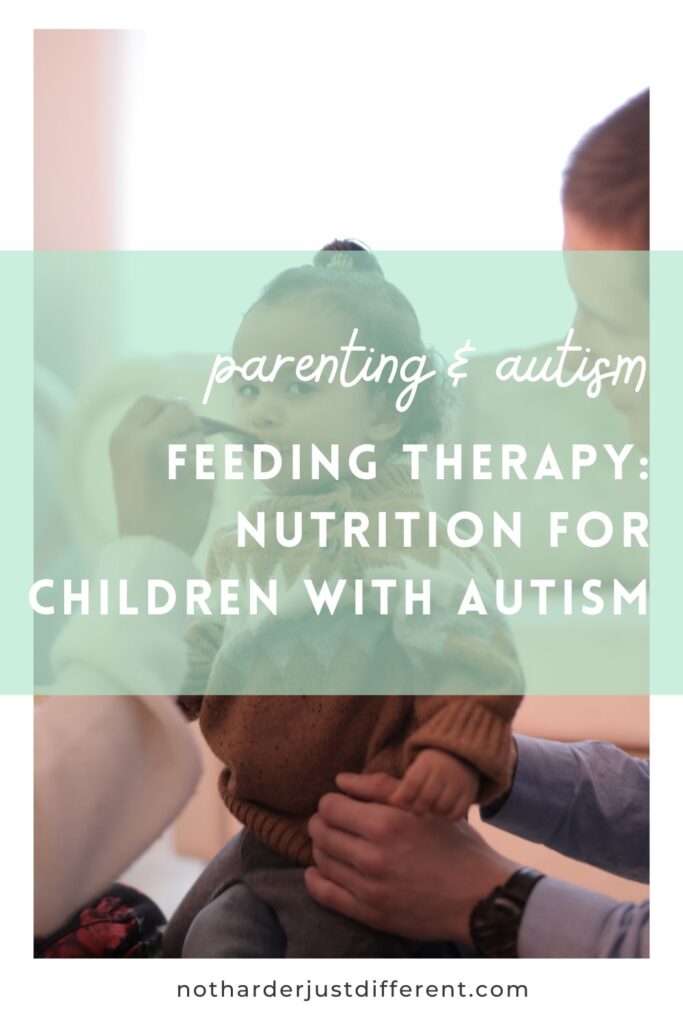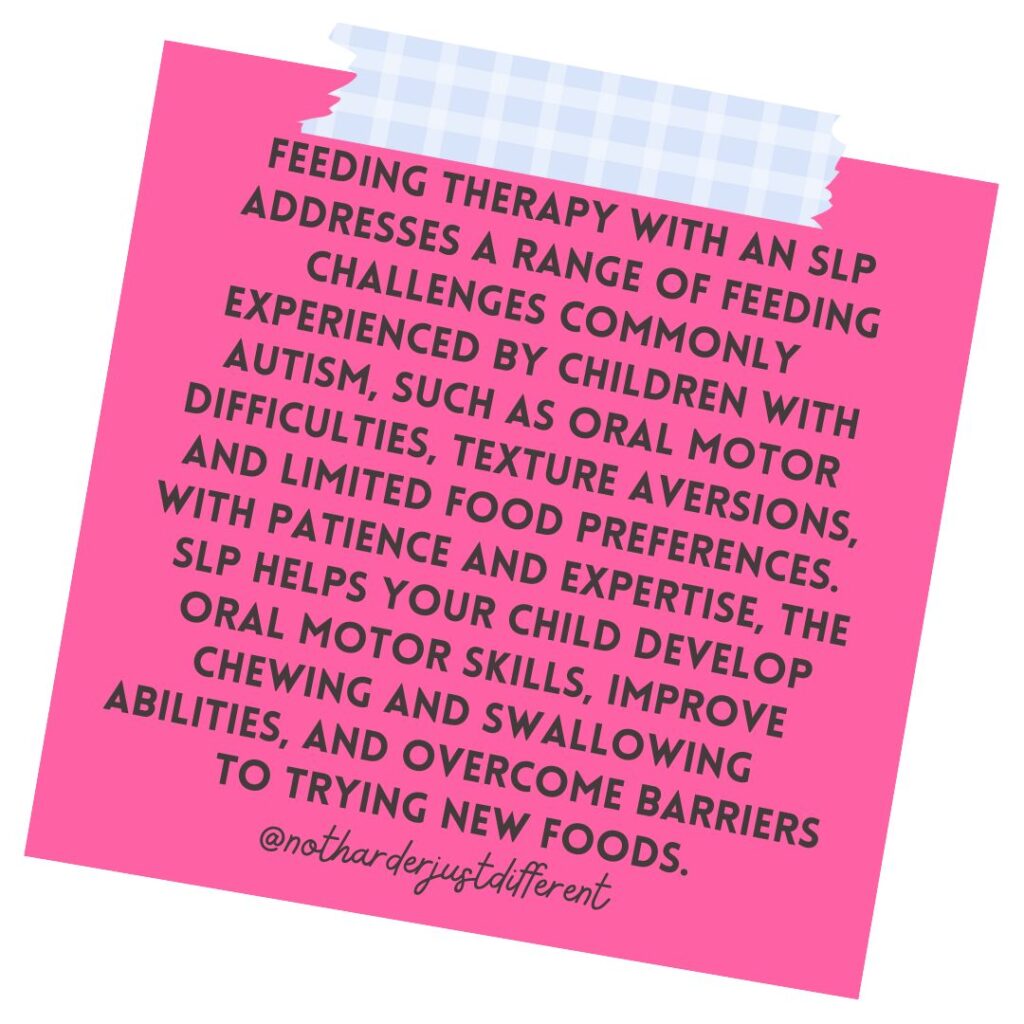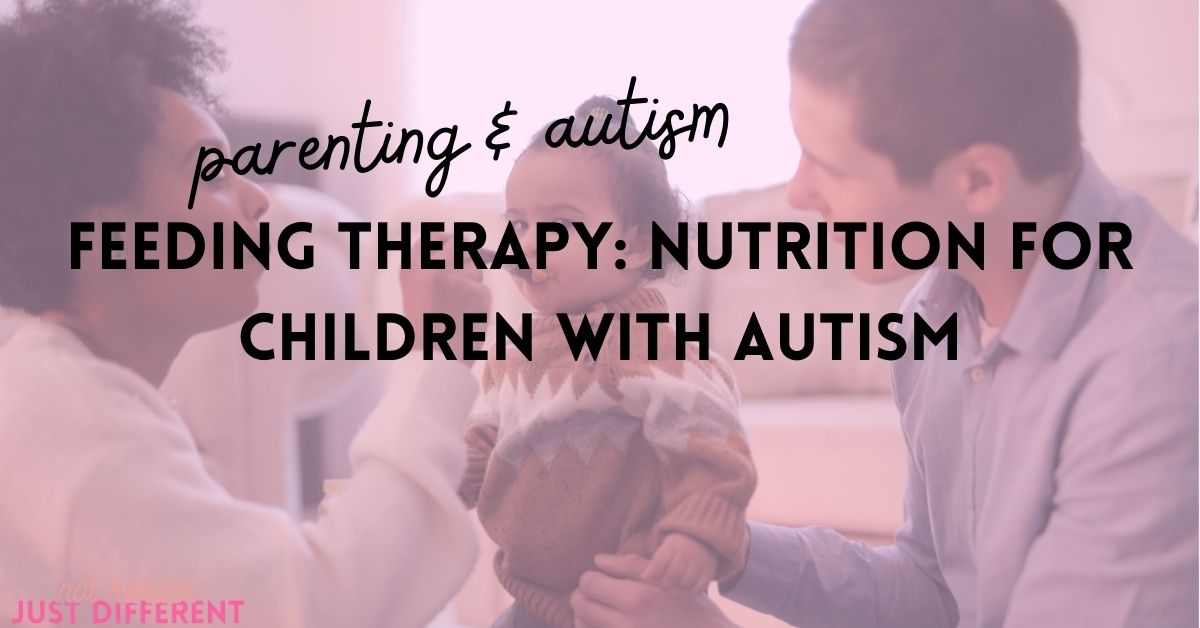Disclaimer: As a future Licensed Clinical Social Worker (LCSW) currently pursuing my master’s degree, I am passionate about sharing insights and information related to parenting, autism and homeschooling based on my personal experiences and research. However, the content shared on this blog is not intended to substitute professional advice, diagnosis, or treatment. Parenting is a deeply personal journey, and while I strive to provide valuable insights, every family and situation is unique. Readers are encouraged to consult with qualified professionals for personalized guidance tailored to their specific needs and circumstances.
If you’ve ever wondered how to help your child with autism develop healthy eating habits and enjoy mealtimes, then you’re in the right place! Feeding therapy isn’t just about food – it’s about nourishing growth, building positive relationships with food, and making mealtimes enjoyable for the whole family.
Feeding therapy with an SLP is like having a trusted guide on your child’s nutrition journey. It’s all about understanding your child’s unique needs, addressing feeding challenges, and empowering your child to explore new tastes and textures with confidence. Whether your child struggles with food aversions, sensory sensitivities, or mealtime behaviors, feeding therapy offers a holistic approach to support your child’s nutritional health and well-being.

Supporting Nutrition for Children With Autism with Feeding Therapy
Exploring New Tastes and Textures
First up, feeding therapy introduces your child to new flavors and textures. Under the guidance of a skilled SLP, your child can explore a variety of foods in a safe and supportive environment. From crunchy vegetables to smooth purees, feeding therapy encourages sensory exploration and helps your child expand their palate with nutritious options.
In feeding therapy, your child may engage in sensory exploration activities to become more comfortable with new tastes and textures. These activities could include food play with various textures (e.g., squishing, squeezing, and molding dough), taste testing different foods using a “food adventure” game, or participating in cooking activities to explore ingredients and cooking methods. Through hands-on experiences, your child learns to interact with food in a fun and non-threatening way, gradually expanding their food repertoire.
Building Positive Mealtime Experiences
Feeding therapy focuses on creating positive mealtime experiences that foster relaxation, enjoyment, and connection for your child and the whole family. Through playful activities, interactive games, and family-centered strategies, feeding therapy transforms mealtimes into moments of joy and bonding.
Feeding therapy emphasizes creating a positive and relaxed atmosphere during mealtimes to encourage healthy eating habits. Your SLP may incorporate games and interactive stories into mealtime routines to make them more enjoyable for your child. Activities like “make-your-own” pizza nights, themed mealtime parties, or setting up a special mealtime area with colorful placemats and utensils can help transform mealtimes into engaging and memorable experiences for your child and the entire family.

Addressing Feeding Challenges
Feeding therapy with an SLP addresses a range of feeding challenges commonly experienced by children with autism, such as oral motor difficulties, texture aversions, and limited food preferences. With patience and expertise, the SLP helps your child develop oral motor skills, improve chewing and swallowing abilities, and overcome barriers to trying new foods. By breaking down feeding challenges into manageable steps, feeding therapy empowers your child to approach mealtimes with confidence and curiosity.
Feeding therapy targets specific feeding challenges your child may encounter, such as difficulty with chewing or swallowing certain foods. Your SLP may introduce oral motor exercises, like blowing bubbles or sucking through straws of varying thickness, to strengthen the muscles used for eating and drinking. Texture progression activities, such as gradually introducing purees, soft solids, and crunchy foods, help desensitize your child to different food textures and promote successful eating experiences.
Promoting Nutritional Health
Nutrition is the cornerstone of your child’s overall health and well-being. Feeding therapy focuses on promoting nutritional health by ensuring that your child receives the essential nutrients they need for growth and development. With personalized meal plans, dietary recommendations, and nutritional guidance, feeding therapy helps you make informed choices that support your child’s nutritional needs and dietary preferences.
Nutritional guidance and meal planning are essential components of feeding therapy to ensure your child receives the nutrients they need for growth and development. Your SLP may work closely with a registered dietitian to develop personalized meal plans that accommodate your child’s dietary preferences, allergies, and nutritional requirements. Activities may include creating visual meal schedules, exploring food groups through interactive games, and incorporating nutrition education into mealtime discussions to promote balanced and nutritious eating habits.
Fostering Independence and Self-Confidence
Feeding therapy encourages your child to become an active participant in their own nutrition journey. Through hands-on experiences, food exploration activities, and mealtime routines, feeding therapy fosters independence and self-confidence in your child’s ability to make healthy food choices and enjoy a variety of foods. By empowering your child to take ownership of their nutrition, feeding therapy sets the stage for lifelong habits of health and well-being.
Feeding therapy encourages your child to take an active role in meal preparation and decision-making, fostering independence and self-confidence. Your SLP may involve your child in grocery shopping trips to select foods they want to try, empowering them to make choices about their meals. Mealtime routines, such as setting the table, serving themselves, and cleaning up after meals, provide opportunities for your child to practice independence and develop important life skills that promote autonomy and self-esteem. Through gradual exposure and positive reinforcement, your child learns to trust their abilities and approach mealtimes with a sense of empowerment.
In conclusion, feeding therapy with an SLP is a valuable resource for supporting nutrition, promoting healthy eating habits, and creating positive mealtime experiences for children with autism. With the support of a skilled SLP and a sprinkle of patience and love, your child can embark on a nourishing journey of growth, exploration, and enjoyment with food.

